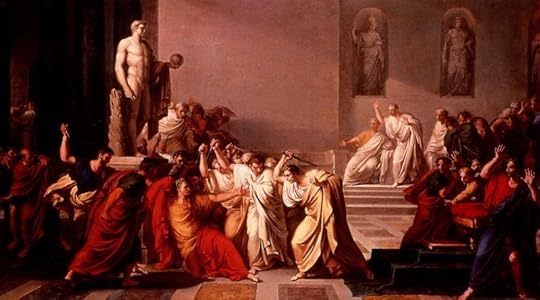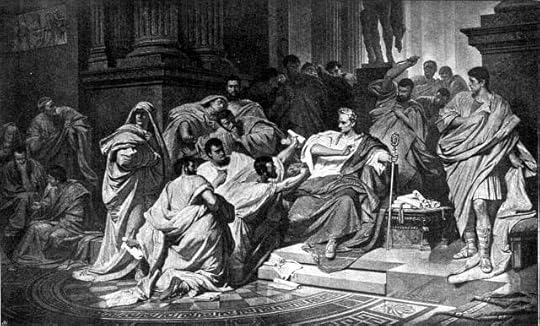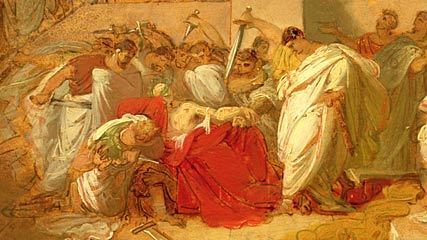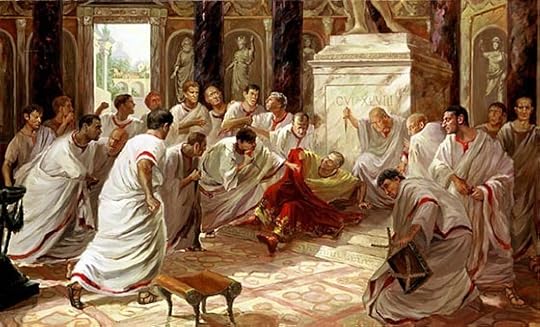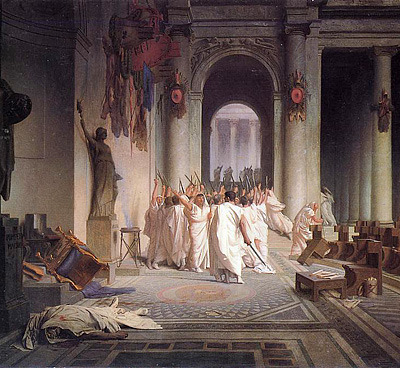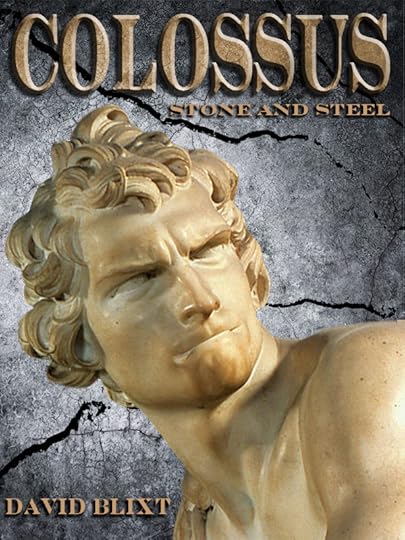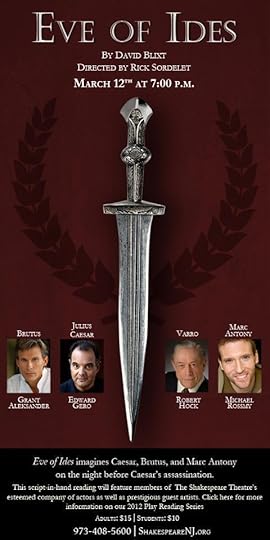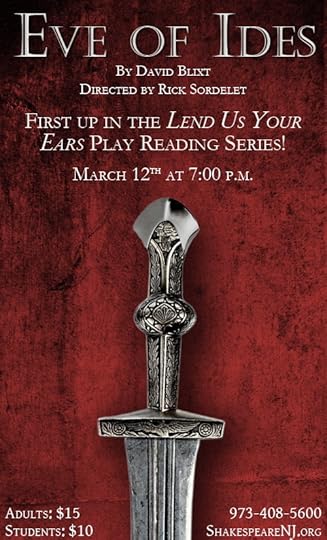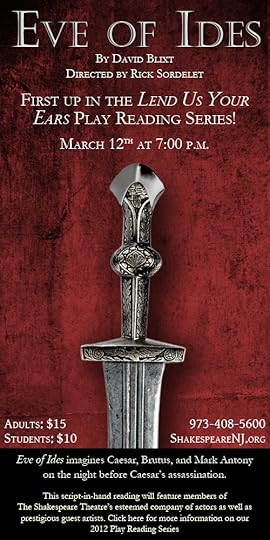David Blixt's Blog, page 22
April 6, 2012
An Open Letter to Rachel Maddow
Dear Rachel et al,
Firstly, as a regular watcher, let me say how much I enjoy your show. I especially enjoy how you frame the debate (which is partly why I loved DRIFT). Your eye for the larger narrative and historical context makes your show really the only one I watch regularly (though Up may soon be a fixture as well).
Secondly, as a former Michigander who still spends a great deal of time in the state, I was horrified by your segment last night. I've watched with dismay, disgust, and disbelief at what has happened to my home state in the past year. I don't understand how the upending of democracy is not a national story, and I certainly don't understand why it's not a local one, why the Detroit Free Press and others aren't yelling their heads off. Is this what happens with the demise of newspapers?
I spend a lot of time researching history. Like many, I am particularly drawn to Rome. And while it's common to compare the US today to ancient Rome (gladiators!), I wanted to pose a question and see if it leads you anywhere in your framing of the debate, or if it's too obscure.
In the founding of America, we were very much based on the Roman model. House, Senate, President (consul), Courts. Rumor says Washington DC was originally called New Rome, and that certain wags wanted to rename the Potomac "New Tiber." The eternal flame in the US Senate is an homage to the flame of the Vestal Virgins. Washington's monument is an obelisk, just like the ones Rome took from Egypt. In Lincoln's Memorial, Lincoln is seated in the pose of a Roman consul. Etc. With so much emphasis on Rome, is it inevitable that we follow their path?
We can debate the precise moment that Rome ceased to be a Republic. Most point to Caesar crossing the Rubicon. But Caesar wasn't the first dictator. The office of Dictator was a legal one, designed for a moment of crisis. If Rome was in a "tumult" a single man could be empowered to rule without check for six months, and forever after be free from any legal consequences. It probably seemed quite necessary at the time. But Lucius Cornelius Sulla marched an army on Rome and had himself made dictator, staying in the post for 6 YEARS while he rewrote Rome's constitution. In an ironic twist, he created the first standing courts. He also set the precedent for Caesar becoming Dictator For Life.
Not long after, Cicero used a similar law to suspend normal governance so he could execute 5 Roman citizens without a trial.
Which brings me to my question: When do we stop being the people we say we are?
Answer: When we stop believing in the Law.
Look at the last ten years: indefinite detention without due process, torture, illegal wiretapping of citizens, designated "protest areas," and on and on. Now we have, in effect, the Dictator of Michigan - or a bunch of dictators, each one ruling a Michigan city-state. People in government (mostly Republicans) are tying themselves into pretzels to bypass the Law to achieve their goals. And in so doing, the Republicans are undermining the republic.
The phrase "equal protection under the law" is not meaningless, nor is it bland. It has incredible power. Equal. We are all equal under the law.
Except now we're not.
If the law-makers break their own laws, what's an honorable citizen to do? If those charged with making the laws hold the Law in contempt, if they hold one set of laws for those in their good graces and another for those they despise, where do we turn? What is our recourse?
If our government finds ways to circumvent our laws, no matter the goal or intent, we've stopped being the people we say we are.
I've been waiting for someone to pose Governor Snyder this question: What if President Obama looked at Michigan and said, "You're not running the state effectively. Therefore I'm setting aside the elected governor and the Michigan congress and appointing my own friend and campaign donor to run your state indefinitely." The Right would go crazy! Socialism, Marxism, lots of -isms. Yet this is precisely what they've done to local city governments! If it is wrong, it is always wrong.
We now live in the land of "Do as I say, not as I do." Which in practice means we no longer live in a society of Law. I want to tell Republicans that a deeply held conviction isn't deeply held if it applies differently in different circumstances. Morality and the Law are the same, in that if they change in context, if they do not apply to all situations, they are not worth having.
This plays into your larger narrative of Republicans disavowing their own positions if their political opponents take them up. Today's Republican party has no deeply held belief other than 1) No Taxes, 2) Do As I Say, Not As I Do, 3) If You're For It, I Must Be Against It.
If we follow those principles, we are less than we say we are. Who do we say we are? We're the people who won World War Two. You need saving? We're there. We don't start fights, but we end them. We're the ones German mothers told their sons to surrender to. We're Captain America. We believe in freedom and democracy. We believe in fairness, and justice. And the Law.
This piece is long enough. I'd love to chat with you or your staff sometime, and even take you to dinner next time I'm in NY. Until then, keep doing everything you're doing. Thank you.
David Blixt
Visit msnbc.com for breaking news, world news, and news about the economy
April 3, 2012
HER MAJESTY'S WILL cover!!!!
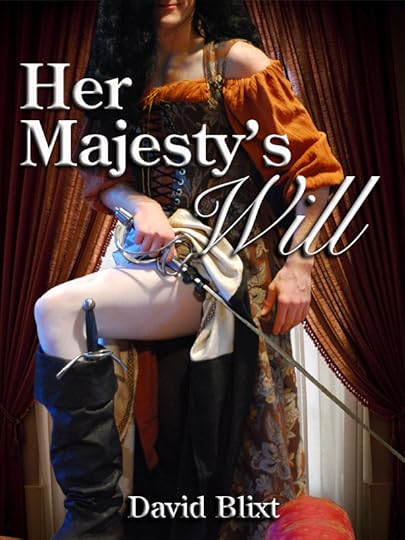
Thanks to the wonderful Rob McLean for bringing to life an image I've had in my head for over two years. Thanks to Paul Metreyeon for taking the photo. Thanks to Elizabeth MacDougald for the dress. The model shall remain nameless until I have permission from his mother.
April 23rd - HER MAJESTY'S WILL - a novel of Will Shakespeare, Kit Marlowe, and the Babington Plot.
Before he was famous, he was a fugitive.
Before he wrote of base humanity, he lived it.
Before he was the Bard of Avon, he was a spy.
A very poor spy.
England, 1586. Swept up in the skirts of a mysterious stranger, Will Shakespeare becomes entangled in a deadly and hilarious misadventure as he accidentally uncovers the Babington Plot, an attempt to murder Queen Elizabeth herself. Aided by the mercurial wit of Kit Marlowe, Will enters London for the first time, chased by rebels, spies, his own government, his past, and a bear.
Through it all he demonstrates his loyalty and genius, proving himself to be - HER MAJESTY'S WILL.
March 20, 2012
COLOSSUS Cover!
Below is the cover for COLOSSUS: STONE & STEEL, the first of the Colossus series that begins with the battle of Beth Horon and goes all the way to the early Colosseum games. This novel is the start of the Judean/Roman war, ending with the siege of Jotapata.
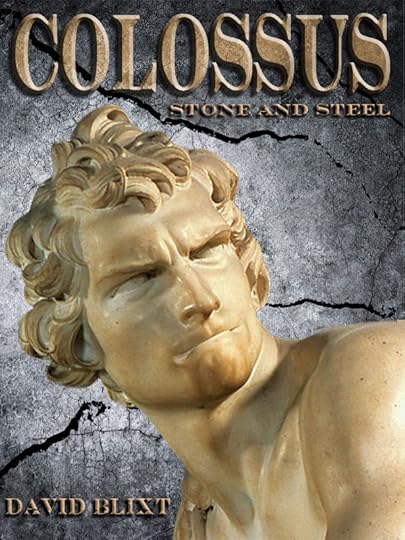
This cover was designed by the amazing Rob McLean, who has cut off my head countless times on stage. The statue is the Bernini David, which has had Rob's wife and mine mocking us relentlessly: "Why are they doing a cover of David's face?" By which I'm told they mean me (I don't see it). But I love this cover. And using statues is great for the series. Next book? COLOSSUS: THE FOUR EMPERORS. Perfect.
March 15, 2012
EVE OF IDES aftermath

Home again after a whirlwind tour on the East Coast with my friend, Director Rick Sordelet. He helmed our reading on Monday night of EVE OF IDES, my play about Caesar and Brutus the night before the assassination. It was honestly a smashing success, beyond my dreams. In the talkback, Rick pointed out that 90% of directing is casting. With Ed Gero as Caesar, Grant Aleksander as Brutus, Mike Rossmy as Antony, Bob Hock as Varro, and Arthur Lazalde as the Servant, the cast was out of this world. The wry gravitas of Gero was perfectly counterpointed by the Atticus Finch-like integrety of Aleksander.
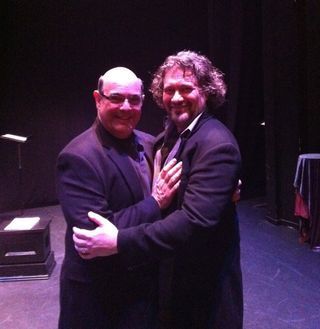 Part of the joy for me was hearing the laughs. I've written a piece that is so wordy - one audience member described it as almost a radio-play - that I was afraid there wouldn't be room for laughter. But man, did Ed and Grant find the rhythm I had in my head. The best laughs were the ironic ones, with the crowd darkly amused at Caesar's sardonic take on politics. There aren't jokes in the play - all the humor comes from the characters. It was great to hear it there.
Part of the joy for me was hearing the laughs. I've written a piece that is so wordy - one audience member described it as almost a radio-play - that I was afraid there wouldn't be room for laughter. But man, did Ed and Grant find the rhythm I had in my head. The best laughs were the ironic ones, with the crowd darkly amused at Caesar's sardonic take on politics. There aren't jokes in the play - all the humor comes from the characters. It was great to hear it there.
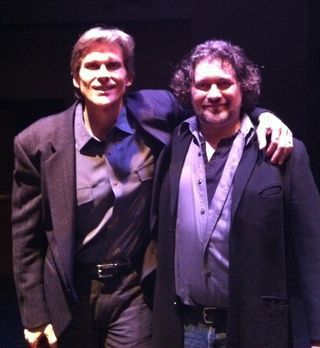 Another delight was the talkback itself. It was clear that the full house were fully engaged in the script, with great questions and comments. I agreed with everything said, right down to the flaws still in the script - things that only shake out with live actors and real audiences to react off of. There was talk of history and stark tone shifts, Shakespeare versus Dante, and trusting the audience to make intuitive leaps. One young man was especially amazed that I didn't set out to write a modern polemic, that the parallels to modern politics were just there. But it's true - I was writing a play about Caesar and Brutus. That they reflect our current state is terrifying, and I was certainly aware of the confluence. But plays are about character, and there are few characters more fascinating than Caesar and Brutus.
Another delight was the talkback itself. It was clear that the full house were fully engaged in the script, with great questions and comments. I agreed with everything said, right down to the flaws still in the script - things that only shake out with live actors and real audiences to react off of. There was talk of history and stark tone shifts, Shakespeare versus Dante, and trusting the audience to make intuitive leaps. One young man was especially amazed that I didn't set out to write a modern polemic, that the parallels to modern politics were just there. But it's true - I was writing a play about Caesar and Brutus. That they reflect our current state is terrifying, and I was certainly aware of the confluence. But plays are about character, and there are few characters more fascinating than Caesar and Brutus.
I owe huge thanks to Bonnie Monte, the Artistic Director of the Shakespeare Theatre of New Jersey for inviting us into her space and giving us the honor of kicking off their 50th season. Associate AD Joe Discher was fantastic, hanging with us for our five hours of rehearsal and giving voice to ideas on how to make the stage smoother.

But the guy to whom I owe the biggest ovation is Rick Sordelet, the director of the piece. The whole reading wouldn't have happened without him. Last fall, when it was originally scheduled, he had a sudden conflict, and I decided I'd rather postpone the reading than lose him at the helm. He's the man with the vision for bringing this play to the stage. I sometimes think he sees it more clearly than I do - clearly his casting choices were spot on. The only one of the cast I knew previously was Ed Gero, and I hadn't even considered him for Caesar. The moment Rick said his name I said, "Wow. Of course." And he was right.
We've already had meetings and are talking with other companies about holding more readings, garnering more interest and gaining steam. I'm honestly surprised at the level of interest, but it seems that Caesar and Brutus aren't played out yet - far from it. Walking around anonymously at intermission, I heard two comments repeated time and again: "It's really good!" and "I sure am learning a lot." Both make me glow.
I'll have more soon about the books (38 days and counting, folks!). The rest of this month is about editing - FORTUNE'S FOOL, HER MAJESTY'S WILL, COLOSSUS, and the rest. But before any of that, I'm diving into EVE OF IDES one more time to make some tweaks while they're still fresh in my head. Fitting - fixing the EVE OF IDES on the Ides themselves.
BEWARE!
March 9, 2012
COLOSSUS - The Roman/Judean War
I have a feeling that with the Kindle printing of THE MASTER OF VERONA, along with its two sequels VOICE OF THE FALCONER and FORTUNE'S FOOL, along with my Will Shakespeare and Kit Marlowe spy novel HER MAJESTY'S WILL, the other book published on April 23rd might get short shrift. MoV has eager (and patient) fans, so the sequels will be talked about. HMW is a fun, lewd, silly, melodramatic, road/buddy comedy, and the cover alone will have people talking (hee hee!).
But since the Ides are coming, and I'm spending the next few days prepping my original play EVE OF IDES for its first public reading at the Shakespeare Theatre of New Jersey, my mind is very much on Rome. Which bring us to the fifth book being published by me next month. It's the first of the series I've been working on for the last three years, called COLOSSUS.
COLOSSUS covers a lot of ground - the writing of the Gospel of Mark, the Siege of Jotapata, Nero's death, the Year of the Four Emperors, the destruction of Jerusalem, Titus' Triumph, Masada, the building of the Colosseum, the rise of the Christian sect in Rome, the martyrdom of Saint Clemens, and finally the writing of the Gospel of Matthew (no no, nothing ambitious here. Move along). It is also the only of my novels that has absolutely nothing at all to do with Shakespeare. No really. Nothing.
I wrote the COLOSSUS series entirely backwards - which means I've got most of it written already. I'll talk more later about the inspirations, but I began knowing the ending, then worked my way from the end to the beginning. My original prologue was the fall of Jerusalem, and the first chapter was the Triumph as captive Jews were marched through Rome. My agent read it and said, "Great. Now write the beginning." So I went backwards another ten years, exploring the war between the Judeans and the Romans. It was originally all one big book. At many people's behest (and my wife's disgust) I've chopped it into component parts, so that each of the events above has its due.
The first novel is COLOSSUS: STONE & STEEL. It begins with Saint Peter leaving Judea for the last time, on his way to Rome. It then shifts quickly to the Battle of Beth Horon, and Nero's response, leading to the siege of Jotapata. Our main character is Judah ben Mattais, a stonemason who discovers his hands are good for pummeling Romans as well as bricks and clay. We also follow: Josephus, later an historian but now a priest/general in charge of Jotapata's defence; Deborah, Judah's forbidden love; Titus, son of Vespasian, the Roman general in charge of subduing the Hebrew rebellion; Queen Berenice, Titus' lover and sister to the King of Judea; and Judah's twin brother Asher, as thoughtful as Judah is rash.
Since this is the novel that needs the most teasing, I'll be talking about it quite a bit over the next month. But for the moment, enjoy a mock-up of the cover, done by my friend, the amazing Rob McLean.
COLOSSUS: STONE & STEEL arrives on Amazon Kindle on April 23rd!
March 8, 2012
EVE OF IDES cast!
March 6, 2012
Playwright's Note to EVE OF IDES
I was asked to jot down a few thought's for next week's reading of EVE OF IDES at the Shakespeare Theatre of New Jersey. I may turn this into something more at a later date - there's so much to say about Shakespeare's portrayal of Brutus - but here's the one-page version. Enjoy!
Playwright's Note
The historian Plutarch tells us the night before he was assassinated, Caius Julius Caesar attended a dinner party. Also in attendance were his nephew Marcus Antonius (Mark Antony) and the leader of the regicidal assassins, Marcus Junius Brutus.
It's hard to think of any historical figure more redeemed with the stroke of a playwright's pen than Brutus. Before Shakespeare's play, he lived in an icy lake at the bottom of Hell. Dante gave Lucifer three mouths, allowing the Devil to chew forever history's greatest betrayers: Judas Iscariot, Caius Cassius, and Brutus. Right through the Renaissance, Brutus was a villain, a treasonous coward who killed perhaps the greatest military and political leader the world had ever known.
Yet in an act of brazen daring, Shakespeare makes Brutus into a hero.
We all agree that it's Brutus' story. For a play named THE LIFE AND DEATH OF JULIUS CAESAR, it's astonishing how little of Caesar there actually is — no Consulship, no pirate ship, no Gaul, no Civil War, no Pompey, no Cleopatra. We pick up at the end of the dictatorship, mere days before his death. Alas, Caesar was far too successful in his life to be made into a tragic hero. So Shakespeare, in his brilliance, turns 1600 years of history on its head, transforming Caesar into a half-deaf epileptic narcissist and instead making his play about Brutus, the honorable man.
If there is one great fault in Shakespeare's JULIUS CAESAR, it is the lack of interaction between Brutus and Caesar themselves. Shakespeare's audience was much more knowledgeable about Roman history, so he could take for granted that the nuances would be understood. Today we are not informed of the great and twisted personal relationship these men had, we do not know why Brutus repeatedly says he loves Caesar, nor do we see how they got to the point where murder is necessary, where Brutus believes that it indeed "must be by his death."
EVE OF IDES explores that relationship, both before and after death. The first act records the events of that fateful dinner the night before the Ides. The second act is a scene hinted at in Shakespeare's play, but never staged – the second appearance of Caesar's ghost to Brutus.
Thanks to Rick and Bonnie for making this happen, and thanks to the cast for tackling what is a very word-dense script.
DB
(Disclaimer – any similarity to modern politics is purely coincidental - and scary as hell)
March 5, 2012
One Week From Today - EVE OF IDES
February 27, 2012
FALCONER Tease - The Cover
The long wait is almost over! Here's the cover for VOICE OF THE FALCONER, finally available on Kindle on April 23rd!

